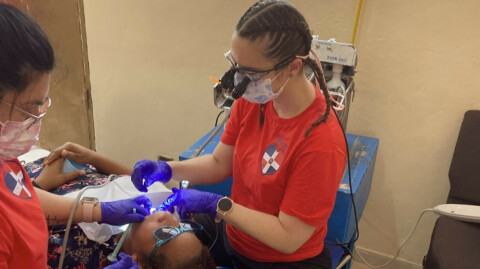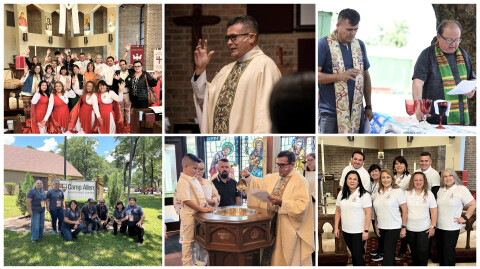Have you ever heard about Confirmation’s checkered past? It's true! We have had problems with this sacramental action since before we became a denomination. Let me quote my own doctoral dissertation, “The theology of the sacramental rite is not clear, the role of Confirmation in salvation is in doubt, and there are serious questions about institution, the age of the confirmand, the celebrant of the rite, and the catechesis used for preparation.” To make matters worse, many in the Episcopal Church see Confirmation as graduation from Sunday school, which often means that youth stop coming to church as soon as the Bishop drives out of our parking lots.
I grew up in the Roman Catholic Church where Confirmation is seen as a sacrament. In traditional Western Theology a valid sacrament must have been instituted by Christ or by the Apostles, must have a constant outward sign that symbolizes the inward grace received through it, must have a particular effect (accomplish something in the confirmand), and it must be necessary for salvation. Since the time of the Reformation, however, Confirmation has come under serious attack. In fact, Martin Luther called it, “Monkey business, fanciful deception, and mambo jumbo.” From the 17th to the 19th centuries various denominations (Anglicans, Presbyterians, and Moravians) abolished the sacrament at various points. In fact, some believe Confirmation was reinstituted in Anglicanism so that Bishops would have something to do during their annual visits to their congregations. In the following paragraphs I will give you a summary of what happened to cause Confirmation to fall out of favor in the Church.
Let us first talk about institution. Acts 8:14-17 and Acts 19:1-7 have been used to claim that Confirmation was instituted by the Apostles and meets this requirement to be one of the seven sacraments of the Church. In one of these texts we see Peter and John in Samaria imposing their hands on Phillip’s new church plant, leading the members to the reception of the Holy Spirit. In the other passage, Paul lays hands on some of John the Baptist’s disciples, who also receive the Holy Spirit. The traditional interpretation of these texts tells us that since these folks had been baptized before, the Apostles action of imposing hands on them was not a baptism, which means it must have been something else. The something else was called Confirmation, which was believed to complete Baptism, which alone was insufficient to lead to the full reception of the Holy Spirit.
Since the Reformation, however, the vast body of research denies that these passages set up a pattern for Confirmation. “In fact, these passages have little to do with a post-baptismal rite, but, rather, these passages are about the inclusion of the lost, which was central to the theology of Luke.” (Roldan, 33.) In other words, what we see here is the welcoming and acceptance of the new church plant in Samaria and the disciples of John the Baptist, rather than the creation of a new sacrament. Therefore, Confirmation was NOT instituted by Christ or the Apostles.
Next comes the issue of a constant and outward sign (the second requirement for an action to be considered a Sacrament.) Water is the outward sign of Baptism, the bread and wine are the outward signs of Holy Communion, the rings are the outward signs of marriage, etc. The problem with Confirmation is that throughout its history it has not had a constant sign. In some churches the Bishop used to give the person a gentle slap on the face to signify maturity, in others the Bishop gives the person a kiss of Shalom, in some they do a signation (sign of the cross) with oil on the person’s forehead, in some (as in ours) the only sign is the imposition of hands, etc. Since the outward sign is not constant, this is not a sacrament.
The next requirement is an effect. Baptism is the rite of new life and entrance into the Church, Marriage is the sacrament of marital union, Holy Communion is the sacrament of union with Christ, etc. But, what does Confirmation do? What does it accomplish as separate from Baptism? Most theologians believe that it is at Baptism that we receive fully the Holy Spirit. Baptism is not an incomplete sacrament, but the first and most important of all sacraments. So, it is unclear what Confirmation does for us.
The last requirement is the most powerful argument against Confirmation as a sacrament. Most theologians uniformly agree that Confirmation is not necessary for salvation. In fact, for most sacramental churches (like ours) only Baptism and the Lord’s Supper, as Sacraments instituted by Christ, are necessary for salvation. For most Evangelicals, the only requirement for salvation is acceptance of Jesus as Lord and Savior and the so-called, “Believer’s Baptism.”
To add to these issues, there is wild disagreement as to the age of the confirmand (Age of reason, 7 years of age, end of Middle School, adulthood? Exactly when should we confirm?) The person who confirms is also highly disputed. There are denominations where the only one who confirms is the Bishop. In other denominations, the priest, regional Dean, or a minister assigned by the Bishop does the confirmation. There is wild disagreement among the experts about whether this is or should be an activity reserved exclusively for Bishops. Lastly, there is no consistent, uniform, denominational catechism to train confirmands. This seems to fall under the prerogative of the priest or youth minister. As a result, some Confirmation programs are extensive and demanding, while others take barely an hour before the Bishop arrives. Sadly, some have no preparation at all.
Despite all these arguments against this sacramental action, I want you to know that I love this tradition in our Denomination, and I believe it is time for us to rediscover a proper theology of Confirmation. Please stay tuned for Part-2 next week.
Until then, may God continue to bless you,
Fr. Roman+





